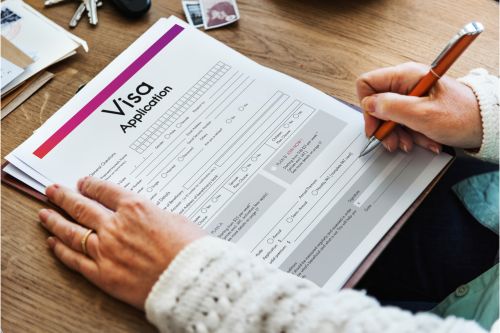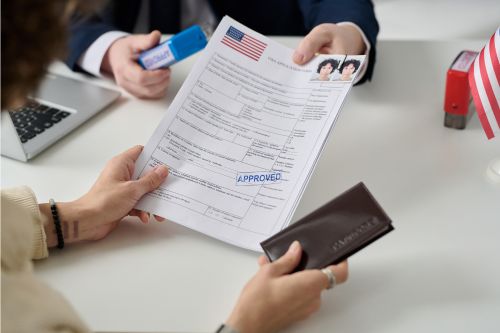Table of Contents
Student Visa for Austria
Navigating the path to studying abroad can be a challenge. Yet, it’s a rewarding journey, especially if you’re considering Austria, a land rich in culture and quality education. The initial step is obtaining a student visa, this might appear challenging, but we are at your service to assist. In this guide, we break down the complex process of obtaining an Austrian student visa.
From understanding student visa types to knowing the Austrian student visa requirements, and student visa success rate we’ve got it all covered. This is your step-by-step guide, making the complicated simple. Let’s navigate now!
Types of Student Visas in Austria
When planning to study in Austria, it’s essential to understand the types of visas available and the one that best suits your circumstances. The primary types of student visas in Austria are the C and the D visa.
- C visa– also known as a ‘Schengen visa’, entitles you to stay in Austria and other Schengen countries for a maximum of 90 days. This visa is perfect for candidates who’ve opted for short courses. Furthermore, this visa is optional if you’re from a country that allows you to enter Austria without a visa.
- D visa– Students planning to study abroad for a semester or engage in longer courses should choose this visa. It caters to stays ranging from a minimum of 91 days up to a maximum of 6 months..
For students intending to stay for more than 6 months, ‘Aufenthaltsbewilligung – Student’ better known as the ‘resident permit for students’, is applicable. This permit allows students to stay in Austria for an extended period, which is ideal for those pursuing a degree program.
Austria student visa requirements

Austria student visa success rate depends on various factors such as the completeness of their application, their academic background, and the specific requirements of the Austrian authorities. Generally, if applicants meet all the necessary criteria and fulfill the visa requirements, the Austria student visa success rate tends to be quite high. Applying for an Austrian student visa or a residence permit involves a series of requirements. The following is a detailed explanation of each document or requirement:
- Passport– The passport is your primary identification document and is mandatory for the application process. Your passport should be valid for at least three months beyond your intended stay in Austria, and have at least two blank pages for the visa stamp.
- Application Form– You need to complete and sign the visa application form. This form typically asks for personal information, details of your travel plans, and the purpose of your visit. It’s crucial to provide accurate and complete information. Any discrepancies may lead to application delays or rejections.
- Passport-size Photos– You will need to provide two recent passport-sized photographs. The photos must be clear, taken against a white background, and show your face clearly. They should oblige to the International Civil Aviation Organization (ICAO) standards. Additionally, color photos should be no older than six months, with dimensions of 35×45 mm.
- Proof of Admission– This is your letter of admission from an Austrian university or educational institution. This letter confirms that you’ve been accepted into a program of study and is a requirement for a student visa.
- Financial Means– You must provide evidence that you have enough money to cover your living costs while in Austria. This could be in the form of bank statements showing sufficient funds, a scholarship or grant letter, or a financial guarantee letter from a sponsor. The required amount varies according to age and relationship status.
- For candidates up to the age of 24 years: € 552.53/ month.
- For candidates ‘of’ and ‘above’ 24 years of age: € 1,000.48/ month.
- Travel Medical Insurance– You must also have travel insurance to cover potential medical emergencies during your journey to Austria. This should cover at least €30,000 and must be valid for the entire Schengen area.
- No Criminal Record: The Austrian authorities need to be sure that you have a clean criminal record. For this, you’ll need a certificate of good conduct or a police clearance certificate from your home country, typically not older than six months.
Austria student visa application Process

Acceptance by an Accredited Austrian University
Before you start your visa application, you must first be accepted into a course at an accredited Austrian university. You need to submit the admission letter from the university during your visa application.
Application Form
Fill out the application form for either a type C visa or a type D visa as per the length of your courses. You can usually download this form from the official website of the Austrian Embassy in your country or region. Make sure you fill out the form completely and accurately.
Collect Necessary Documents
These documents usually include the following:
- A valid passport
- Recent passport-sized photographs
- Birth certificate
- Health insurance coverage (proof of travel insurance valid in Austria and the entire Schengen Area)
- Proof of sufficient funds to support yourself in Austria (such as a bank statement, scholarship certificate, or letter of sponsorship)
- Certificate of criminal record (if applicable)
- Proof of admission into an accredited Austrian university (such as your admission letter)
- Proof of previous educational qualifications (such as diplomas, degrees, or transcripts)
- Proof of German language proficiency (if your course will be in German)
Book an Appointment
You’ll need to submit your application and all necessary documents in person at the Austrian Embassy or Consulate in your country. You can typically book an appointment online through their official website.
Attend the Interview
During your interview, they will ask you to state your reasons for wanting to study in Austria. You may also need to provide biometric data (like fingerprints), depending on the requirements at the time.
Austria student visa fee
Obtaining a student visa for Austria is generally free of charge, although this could change based on policy adjustments. However, if you’re seeking a student residence permit, you should prepare to pay a fee of €120, which doesn’t include the GST.
Typically, the visa application process can range from 2 to 4 weeks. The exact duration can vary depending on the season and application influx, so it might sometimes take longer. Aspiring students are therefore highly advised to initiate their applications at least 6 months in advance.
Student Visa for Austria for Indian Students
Indian students planning to study in Austria must follow the same visa application process as other international students. They must obtain acceptance from an accredited Austrian university, complete the application form, and provide the necessary documents. Additionally, it’s advisable to consider the Austria student visa success rate when planning your application.
Specific Considerations:
- Indian students should ensure that they meet all the requirements important for the student visa, including proof of admission, financial means, and health insurance.
- Indian students may need to meet additional requirements or provide specific documentation related to their nationality. It’s essential to check with the Austrian Embassy or Consulate in India for any country-specific guidelines.
- Indian students should also be aware of any language proficiency requirements, especially if their course will be conducted in German.
Rules and regulations
After successfully receiving your student visa or residence permit for Austria, you must adhere to specific rules and regulations to maintain its validity. Failure to abide by these can lead to penalties or the revocation of your visa.
Travel Permissions and Limitations
With your Austrian student visa or residence permit, you can freely travel within Austria and other Schengen countries. This can be a significant opportunity to explore Europe while you study. However, it is essential to understand that this visa or permit is strictly for study purposes.
While it grants you the right to reside and study in Austria, it does not serve as a ‘full-time’ work visa. As such, you can’t seek full-time employment in Austria or any other Schengen country based on your student visa.
Visa Renewal Procedure
The duration of your student visa or residence permit is tied closely to the length of your study program. If you find that your studies are going to extend beyond your visa validity, you must initiate the renewal process at least three months before your current permit expires.
Renewing your visa or permit ensures that you maintain legal status in Austria and can complete your studies without interruption. The renewal process typically requires you to submit updated proof of enrollment, proof of financial sustenance, and health insurance coverage, among other documents.
Employment Rules
Austria allows international students to work part-time while they study. This can be a valuable opportunity to gain work experience, supplement your income, and thoroughly engross yourself in Austrian society.
However, the Austrian government restricts the number of hours international students can work each week to 20 hours/ week. This ensures that their primary focus remains on their studies.
Change of Address
If you decide to move residences within Austria, you must report your new address to the Austrian immigration authorities within three days of your move. This requirement helps the government maintain accurate records and ensures they can contact you or send you essential communications immediately.
Not reporting a change of address can be viewed as a violation of your visa or permit conditions.
Compliance with Austrian Laws and Institution Rules
Finally, you must comply with all Austrian laws and the regulations set by your educational institution. These can range from academic codes of conduct to local civil laws. Remember, being in a foreign country does not exempt you from adhering to its laws. Failure to comply with the rules can lead to penalties. It can even cause your student visa or residence permit to be revoked, often resulting in immediate expulsion from the country.
Understanding and adhering to these rules will ensure a seamless stay in Austria during your study period. Always remember to be aware of any updates or changes to these rules and regulations.
Austria Student Visa Processing Time
- The processing time for an Austrian student visa can vary depending on various factors such as the time of year, the volume of applications, and the efficiency of the processing center.
- Typically, the visa application process can range from 2 to 4 weeks, but it may sometimes take longer.
- Aspiring students, including Indian students, are advised to initiate their visa applications at least 6 months before their intended start date of study to allow for any potential delays or unforeseen circumstances.
Read more: How Does AI Solve Pain Points of the Traditional Enrollment Process?
Key takeaways
- An admission letter from an Austrian educational institution is crucial for a visa application.
- Demonstrating financial means to support oneself during the study period is essential.
- Applicants need health insurance covering at least €30,000 of medical costs during their stay.
- The visa application processing takes around 2-4 weeks, but applying at least six months in advance is recommended.
Ready for more insights to fuel your study abroad dreams? Don’t miss out on our other informative blogs right here! Navigate into a world of knowledge, tips, and guidance, designed to assist your educational journey. Keep exploring!
Liked this blog? Read next: University of Surrey courses| Everything you need to know.
FAQs
Q: Is it possible to switch universities or courses on a student visa?
Ans: Yes, it’s possible, but you might have to notify the authorities and get approval.
Q: What action should I take if my student visa application gets rejected?
Ans: You can appeal against the decision or address the issue specified in the rejection and reapply.
Q: Can I convert my student visa into a work permit after my studies in Austria?
Ans: Yes, but it’s subject to specific requirements. Check with the Austrian immigration authorities for the exact procedures.






